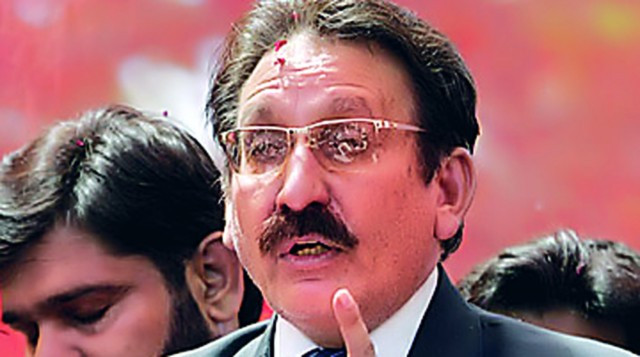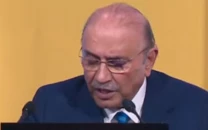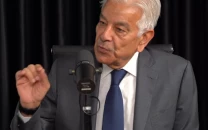Institutions should support each other: CJ
“The court is not here to destroy the system; its duty is to save even a single executive order,” said the CJP.

Resuming his argument from where he’d left off on Tuesday, senior advocate Abdul Hafeez Pirzada told the bench that the 18th amendment had not amended the constitutional article detailing the procedure for judicial appointments but had created a new law.
Here, Justice Shakirullah Jan observed that the setting up of a judicial commission to elect judges is not against the basic structure of the constitution. “Even lawyers representing the bar associations just have reservations regarding the inclusion of the law minister and the attorney general in the commission,” said Jan. Expanding on the merits of the new system, Jan continued: “Earlier, the president nominated candidates; now the judicial commission will”.
But Pirzada refused to be swayed. “The posts of the president and the chief justice have been ineffective by this new system,” he countered. “If article 175-A represents the will of the people, why have the people authorised this court to guard their basic rights?”
Pirzada argued that judges need to be independent before they can guarantee fundamental freedoms to the people. And since article 175-A would compromise the independence of the judiciary, it was inconsistent with the constitutional promise to protect fundamental rights and to not allow any law in derogation of the said rights. As such, argued Pirzada, the article should be shot down.
Here, Justice Saqib Nisar pointed out that the framers of the 1973 constitution who had inserted the article guaranteeing fundamental rights had also provided the procedure for amending the constitution and barred the courts from reviewing constitutional amendments.
To this, Pirzada argued that the apex court had the jurisdiction to review the amendment and to even strike it down, as it had done with the emergency order of November 3, 2007.
Here, Justice Asif Saeed Khosa asked Pirzada about the consequences of implementing judgements on constitutional matters. “What, for example, would be the position of those judgements while the constitution is being amended?” questioned Khosa.
Pirzada’s reply was that the constitution of Pakistan is written and the parliament does not have the right to expunge any article. “The parliament can make amendments but it does not have the power to change the basic structure of the constitution,” he said.
To another question, Pirzada replied that article 58(2)(B) (regarding the president’s discretionary power to dissolve the National Assembly) had no connection with the basic structure.
“In democratic systems, institutions should support each other; such clauses derail the parliamentary system,” observed Chaudhry. “In spite of the Supreme Court having banned use of this article in 1993, the assemblies did not survive. And if assemblies are dissolved every two years, how will the system be strengthened?”
Pirzada’s response was that even the prime minister should not have the right to dissolve the assemblies, to which Justice Saqib Nisar countered drily: “Prime ministers exercise such power wherever there’s a parliamentary system in the world.”
Published in The Express Tribune, July 15th, 2010.



















COMMENTS
Comments are moderated and generally will be posted if they are on-topic and not abusive.
For more information, please see our Comments FAQ